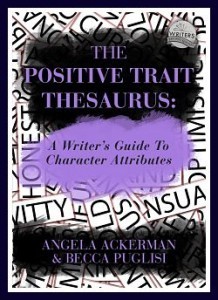Angela Ackerman's Blog: Writers Helping Writers, page 154
January 19, 2015
Becca’s Favorite Reads of 2014
For some unfathomable reason, my library keeps no list of the books I’ve checked out—which is really annoying when I want to reference a book in a blog post or refer a good read to someone else and I CANNOT REMEMBER THE TITLE. So I have to keep my own records. Goodreads is my preferred site for this, since my READ (past tense) list not only keeps track of the books I’ve finished, it also includes the date and my rating.
I love Goodreads. If I was Oprah, I’d give it away as one of My Favorite Things. *cue shrieking*
So now that another year has passed, I’d like to share my favorite books of 2014— ’cause when I find an excellent story, I want to give it some love. Maybe some of these will tickle your fancy. Here they are, in no particular order:
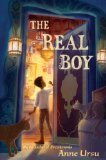 Title and Author: The Real Boy, Anne Ursu
Title and Author: The Real Boy, Anne Ursu
Genre: Fantasy
Synopsis:
On an island on the edge of an immense sea there is a city, a forest, and a boy. The city is called Asteri, a perfect city that was saved by the magic woven into its walls from a devastating plague that swept through the world over a hundred years before. The forest is called the Barrow, a vast wood of ancient trees that encircles the city and feeds the earth with magic. And the boy is called Oscar, a shop boy for the most powerful magician in the Barrow. Oscar spends his days in a small room in the dark cellar of his master’s shop, grinding herbs and dreaming of the wizards who once lived on the island generations ago. Oscar’s world is small, but he likes it that way. The real world is vast, strange, and unpredictable. And Oscar does not quite fit in it.
But it’s been a long time since anyone who could call himself a wizard walked the world, and now that world is changing. Children in the city are falling ill, and something sinister lurks in the forest. Oscar has long been content to stay in his small room in the cellar, comforted in the knowledge that the magic that flows from the trees will keep his island safe. Now, even magic may not be enough to save it.
Why I Loved It: Anne Ursu is quickly becoming one of my favorite authors due to her impressive world building and her ability to turn a unique phrase. I also had no idea that this story was a fairy tale retelling until I was halfway through the book. The story is complex and engaging enough to stand on its own.
 Title and Author: Clariel, Garth Nix
Title and Author: Clariel, Garth Nix
Genre: Fantasy
Synopsis:
Award-winning author Garth Nix returns to the Old Kingdom with a thrilling prequel complete with dark magic, royalty, dangerous action, a strong heroine, and flawless world-building. This epic fantasy adventure is destined to be a classic, and is perfect for fans of Game of Thrones.
Clariel is the daughter of one of the most notable families in the Old Kingdom, with blood relations to the Abhorsen and, most important, to the King. She dreams of living a simple life but discovers this is hard to achieve when a dangerous Free Magic creature is loose in the city, her parents want to marry her off to a killer, and there is a plot brewing against the old and withdrawn King Orrikan. When Clariel is drawn into the efforts to find and capture the creature, she finds hidden sorcery within herself, yet it is magic that carries great dangers. Can she rise above the temptation of power, escape the unwanted marriage, and save the King?
Why I Loved It: I’m a huge Garth Nix fan. HUGE. His Abhorsen trilogy is one that I look back on as forming my early ideas as an author. His world building is second to none. So when I heard that he’d written a prequel for this series, I was super excited and also more than a little nervous, believing it couldn’t live up to the rest of the series. Thank goodness I was wrong.
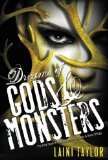 Title and Author: Dreams of Gods and Monsters, Laini Taylor
Title and Author: Dreams of Gods and Monsters, Laini Taylor
Genre: Urban Fantasy
Synopsis of the First Book in the Series (Daughter of Smoke and Bone):
Around the world, black handprints are appearing on doorways, scorched there by winged strangers who have crept through a slit in the sky.
In a dark and dusty shop, a devil’s supply of human teeth grown dangerously low.
And in the tangled lanes of Prague, a young art student is about to be caught up in a brutal otherwordly war.
Meet Karou. She fills her sketchbooks with monsters that may or may not be real; she’s prone to disappearing on mysterious “errands”; she speaks many languages–not all of them human; and her bright blue hair actually grows out of her head that color. Who is she? That is the question that haunts her, and she’s about to find out.
When one of the strangers–beautiful, haunted Akiva–fixes his fire-colored eyes on her in an alley in Marrakesh, the result is blood and starlight, secrets unveiled, and a star-crossed love whose roots drink deep of a violent past. But will Karou live to regret learning the truth about herself?
Why I Loved It: Angels and demons, a celestial war, an urban fantasy partially set in the fascinating Prague…what’s not to love?
 Title and Author: If You Find Me, Emily Murdoch
Title and Author: If You Find Me, Emily Murdoch
Genre: Contemporary
Synopsis:
A broken-down camper hidden deep in a national forest is the only home fifteen year-old Carey can remember. The trees keep guard over her threadbare existence, with the one bright spot being Carey’s younger sister, Jenessa, who depends on Carey for her very survival. All they have is each other, as their mentally ill mother comes and goes with greater frequency. Until that one fateful day their mother has disappeared for good, and two strangers arrive. Suddenly, the girls are taken from the woods and thrust into a bright and perplexing new world of high school, clothes and boys.
Now, Carey must face the truth of why her mother abducted her ten years ago, while haunted by a past that won’t let her go . . . a dark past that hides many secrets, including the reason Jenessa hasn’t spoken a word in over a year. Carey knows she must keep her sister close, and her secrets even closer, or risk watching her new life come crashing down.
Why I Loved It: This one grabbed me with the premise: an isolated teenager raised in the woods who’s forced to assimilate into modern-day society. What kept me reading was the achingly real and empathetic main character.
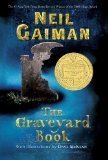 Title and Author: The Graveyard Book, Neil Gaiman
Title and Author: The Graveyard Book, Neil Gaiman
Genre: Fantasy
Synopsis:
In this Newbery Medal-winning novel, Bod is an unusual boy who inhabits an unusual place—he’s the only living resident of a graveyard. Raised from infancy by the ghosts, werewolves, and other cemetery denizens, Bod has learned the antiquated customs of his guardians’ time as well as their ghostly teachings—such as the ability to Fade so mere mortals cannot see him.
Can a boy raised by ghosts face the wonders and terrors of the worlds of both the living and the dead? And then there are being such as ghouls that aren’t really one thing or the other.
Why I Loved It: Um, it’s Neil Gaiman?
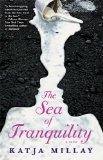 Title and Author: The Sea of Tranquility, Katja Millay
Title and Author: The Sea of Tranquility, Katja Millay
Genre: Contemporary
Synopsis:
I live in a world without magic or miracles. A place where there are no clairvoyants or shapeshifters, no angels or superhuman boys to save you. A place where people die and music disintegrates and things suck. I am pressed so hard against the earth by the weight of reality that some days I wonder how I am still able to lift my feet to walk.
Two and a half years after an unspeakable tragedy left her a shadow of the girl she once was, Nastya Kashnikov moves to a new town determined to keep her dark past hidden and hold everyone at a distance. But her plans only last so long before she finds herself inexplicably drawn to the one person as isolated as herself: Josh Bennett.
Josh’s story is no secret. Every person he loves has been taken from his life until, at seventeen years old, there is no one left. When your name is synonymous with death, everyone tends to give you your space. Everyone except Nastya who won’t go away until she’s insinuated herself into every aspect of his life. But as the undeniable pull between them intensifies, he starts to wonder if he will ever learn the secrets she’s been hiding—or if he even wants to.
The Sea of Tranquility is a rich, intense, and brilliantly imagined story about a lonely boy, an emotionally fragile girl, and the miracle of second chances.
Why I Loved It: The main character was utterly unique and intensely flawed. And what started as a possible love triangle turned into something unpredictable, which was a refreshing change. Also, it has possibly the BEST ENDING LINE OF A NOVEL EVER.
So those are my top picks for 2014. What about you? Care to share which books you loved and why?
The post Becca’s Favorite Reads of 2014 appeared first on WRITERS HELPING WRITERS™.
January 17, 2015
Talents and Skills Entry: Farming
As writers, we want to make our characters as unique and interesting as possible. One way to do this is to give your character a special skill or talent that sets him apart from other people. This might be something small, like having a green thumb or being good with animals, to a larger and more competitive talent like stock car racing or being an award-winning film producer.
When choosing a talent or skill, think about the personality of your character, his range of experiences and who his role models might have been. Some talents might be genetically imparted while others are created through exposure (such as a character talented at fixing watches from growing up in his father’s watch shop) or grow out of interest (archery, wakeboarding, or magic). Don’t be afraid to be creative and make sure the skill or talent is something that works with the scope of the story.

FARMING
Description: The planting and nurturing of seeds to maturity for consumption and profit. There are many steps to farming, including preparation of the land using tools and machinery, understanding the needs of one’s crops as far as irrigation, nutrients and optimal sunlight conditions, and being able to harvest at the correct time, using methods that are economical as well as efficient. The result is the careful collection and storage of a crop that avoids as much product waste as possible. Crops might be for human or animal consumption, and are specific to the climate and growing zone. Most farmers also cultivate different types of crops (or raise livestock) to lower the risk if a particular crop does not do well in any given year.
Beneficial Strengths or Abilities: being physically strong and steady, having a deep interest in (and respect for) the land and farm lifestyle, the ability to manage one’s resources well, a keen eye for early signs of problems (such as pest and drought indicators, or an imbalance in the soil’s nutrients), being mechanically minded to fix and maintain one’s own machinery, having a gift for repurposing so nothing is wasted, carpentry skills (to build sheds, fences, etc.), an affinity for animals, handiness with a rifle for protection if wildlife is a factor, a proactive nature, contentment with a quieter way of life, etc. Many people who farm also try to provide their own food, so gardening skills and being able to raise and care for animals properly are also good skills to have.
Character Traits Suited for this Skill or Talent: self-sufficient, hard working, patient, perseverance, helpfulness, calm, intelligence, deep thinking, clever, curiosity
Required Resources and Training: Often people who grow crops or plants are those who have been raised on farms, and so exposure to the growth cycle and the routine of planting and harvesting over the years leads to rich experience on all aspects of farming. Understanding the climate is key, as not all crops are suited for all areas, and have different challenges to overcome. Farmers run and maintain their own equipment and structures, so mechanical and building knowledge is part of the package. Budget and resource management is necessary as yields are not always uniform, and paychecks are not consistent. Equipment breakdowns are expensive, so planning for emergencies is also a way of life for farmers.
Associated Stereotypes and Perceptions:
Farming is dull and boring, and so the people who farm must be too
It is difficult to make money farming as crops are dependent on climate
Farming is a quiet life with little human interaction outside of family
Scenarios Where this Skill Might be Useful:
understanding the cultivation of seeds is important to survival if goods are not readily available (or are expensive)
farming skills would be highly valued in situations where communities are starting anew with fewer resources (after a war, a forced relocation, etc.)
providing for oneself and one’s family during a time where income is not readily available decreases dependency on other people
You can brainstorm other possible Skills and Talents your characters might have by checking out our FULL LIST of this Thesaurus Collection. And for more descriptive help for Setting, Symbolism, Character Traits, Physical Attributes, Emotions, Weather and more, check out our Thesaurus Collections page.
Image via Catkin @ Pixabay
The post Talents and Skills Entry: Farming appeared first on WRITERS HELPING WRITERS™.
January 15, 2015
Workspace Pictures & Our 2015 Charity Selection
Boy, there are some great pictures coming in from our 100,000 Book Milestone Giveaway. Have you entered yet? If not, click the link above to fill out the form & possibly win one of 10 print copies of either the Emotion, Positive Trait or Negative Trait Thesaurus books. (Unlike most print book giveaways, this one is open internationally, too!)
It is so neat to peer at your work spaces, meet your pets and see your smiling faces in all of these pictures. Too, the stories are great — so many of you have shared tidbits about how your use our books, what you have accomplished with them and how they are constant writing companions. This is just so gratifying for us to hear, so thank you for this gift!
Here are a few of the pictures rolling in:
 Here we have Harry Olsen working on his latest project of awesomeness.
Here we have Harry Olsen working on his latest project of awesomeness.
50 Points to Gryffindor for managing to take a selfie that gets him, his books, his laptop and his printed work in process ALL IN ONE SHOT!
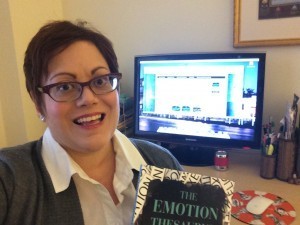 Next is the talented Leslie Zampetti and her strange electronic device that is actually a portal to another realm. On it, she types magical words that will transport readers into the story world.
Next is the talented Leslie Zampetti and her strange electronic device that is actually a portal to another realm. On it, she types magical words that will transport readers into the story world.
Holy zombie cows, I NEED one of these mystical novel-making devices. (And I wish my writing space was as neat as hers too!)
 And here’s Sprite, Jan Markley‘s cat, drinking a mug of whiskey (er, I mean tea OF COURSE!) and likely plotting mayhem that will bring about a fiery apocalypse.
And here’s Sprite, Jan Markley‘s cat, drinking a mug of whiskey (er, I mean tea OF COURSE!) and likely plotting mayhem that will bring about a fiery apocalypse.
Who killed the Dead Bird Through The Cat Door (Jan’s MG novel on screen?) If it wasn’t Colonel Mustard with a wrench in the library, then my vote goes Sprite, after a drinking and catnip binge.
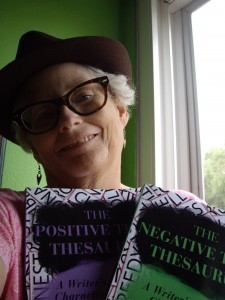 Up next is a picture sent in by Lisanne Cooper, who is obviously a huge fan of the Negative Trait Thesaurus in particular. Why you ask? Because she painted her wall the same shade!
Up next is a picture sent in by Lisanne Cooper, who is obviously a huge fan of the Negative Trait Thesaurus in particular. Why you ask? Because she painted her wall the same shade!
THAT IS DEDICATION, People.
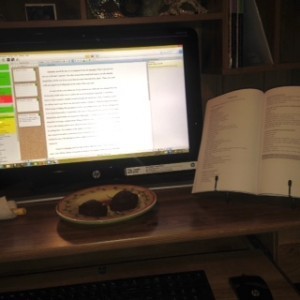 And sweet lord of chocolate goodness…are those BROWNIES?
And sweet lord of chocolate goodness…are those BROWNIES?
Oh, you delicious tease. I wish I was at Sabrina Ramoth‘s house RIGHT NOW.
(Looks like she’s cued up Scrivener and is knee deep in creativity!)
 FACT: Angie Aker not only has a fabulous name, she also has a well-loved Emotion Thesaurus.
FACT: Angie Aker not only has a fabulous name, she also has a well-loved Emotion Thesaurus.
Bring on the folded corners, the highlights and pen notations! This is what we like to see because it means she is getting serious miles from her book as she uses it.
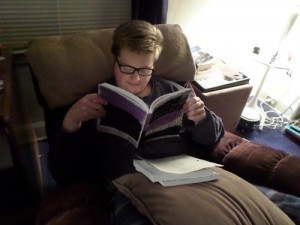 Budding writer Noah is taking after his mom Janet Boyer. This means serious lessons in “sharing” as they swap all three books back and forth.
Budding writer Noah is taking after his mom Janet Boyer. This means serious lessons in “sharing” as they swap all three books back and forth.
There is a dark side of having a child take on the family business, as illustrated here by the pictures below.
Heather O’Connor sent in these pictures she snapped of a LIVE book theft in action when her daughter Alison got too close to the bookshelf…
(WARNING: Graphic images…writers with weak stomachs may want to look away)
I’m not going to lie…it was a grueling battle. Outside, lightning forked across the sky and booms of thunder shook the house. An orchestra showed up and began to play epic battle music as the tug of war raged on. Alison finally prevailed by throwing a handful of colorful M & M’s into the air. Her mother, as you might imagine, was helpless against their chocolatey power (No one can resist M & M’s).
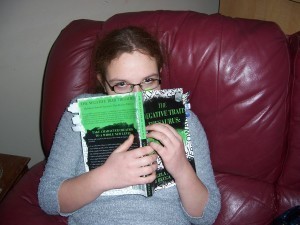
Heather might not see her books for awhile, but we appreciate the book love, no matter how you slice it.
(And please, keep those pictures rolling in!)
Paying It Forward
Each year, Becca and I choose a charity to sponsor here at Writers Helping Writers. So far we have donated $2500 to organizations such as Heifer International (mission: to End Poverty) and the Polaris Project (mission: to stop Human Trafficking). So know that when you purchase a book of ours, you are also sending along some much needed help to someone else!
 This year, Becca and I will be donating to Farm Sanctuary. This charity focuses on rescuing animals from cruelty, re-educating people and advocating for humane treatment.
This year, Becca and I will be donating to Farm Sanctuary. This charity focuses on rescuing animals from cruelty, re-educating people and advocating for humane treatment.
We are able to do this because of your kind support, so thank you so much!
Happy writing!
Angela & Becca
The post Workspace Pictures & Our 2015 Charity Selection appeared first on WRITERS HELPING WRITERS™.
January 12, 2015
100K Book Milestone: Celebrate With Us & Win
Well, it happened. Our small, unusual trio of writing books have officially sold 100,000 copies, which is so freaking incredible. When we launched The Emotion Thesaurus in May of 2012, and then followed up with The Positive and Negative Trait books in October of 2013, we never expected this to happen. (In fact, I remember telling Becca when we wrote the Emotion Thesaurus, I would be happy if it sold 50,000 copies in our lifetime!)
But it did happen, and all because of you. So thank you so, so, SO much–for your support, for recommending our books and website to other writers, agents and editors, and for of course buying our resources yourselves. We hope they are helping you write deep, compelling characters and stories that readers will love!
Becca and I have a very exciting year ahead, and more content planned to help strengthen your writing. We have two Setting Thesaurus books on the go which should be ready later in the year, and one exciting new project that we hope will knock your socks off. We are still finalizing everything as we head in an uncharted new direction, but as soon as we can share, we will.
Now…let’s talk Celebration!
Becca and I are giving away 10 print copies of our books, winner’s choice. This is a great time for you to snag one of our books if you don’t yet have it, refresh a well-used copy that is worn around the edges, or win a book for a critique partner as a gift. The choice is yours!
HOW TO ENTER:
All you need to do for a chance to win is fill out THIS FORM. Easy Peasy. AND, if you email me a picture of one of our books with you, in your workspace, or some other crazy place, you will earn 5 bonus entries! We would love to see pictures of your marked up/notes in the margins/color tabbed to death/etc. copies, too! Just make sure that if you send me a picture, you also provide your full name so I can find you on the form & add 5 bonus entries.
This giveaway is open Internationally–how cool is that? As always, Random.Org is what we use to select the 10 winners. Contest is open until January 18th.
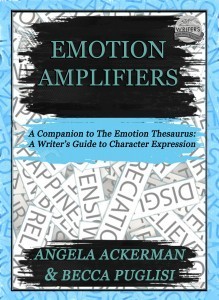 ONE LAST THING…
ONE LAST THING…This might also be a good time to remind everyone that there is now a FREE EBOOK Companion for The Emotion Thesaurus. If you haven’t yet grabbed Emotion Amplifiers, JUST GO HERE to download your copy.
Social Sharing is always appreciated. Good luck to all!
The post 100K Book Milestone: Celebrate With Us & Win appeared first on WRITERS HELPING WRITERS™.
January 10, 2015
Talents and Skills Thesaurus Entry: Haggling
As writers, we want to make our characters as unique and interesting as possible. One way to do this is to give your character a special skill or talent that sets him apart from other people. This might be something small, like having a green thumb or being good with animals, to a larger and more competitive talent like stock car racing or being an award-winning film producer.
When choosing a talent or skill, think about the personality of your character, his range of experiences and who his role models might have been. Some talents might be genetically imparted while others are created through exposure (such as a character talented at fixing watches from growing up in his father’s watch shop) or grow out of interest (archery, wakeboarding, or magic). Don’t be afraid to be creative and make sure the skill or talent is something that works with the scope of the story.
HAGGLING

Claire Rowland @ Creative Commons
Description: Negotiating with someone in order to agree upon a price
Beneficial Strengths or Abilities: being able to read people, knowing the true value of a given product, not being easily intimidated
Character Traits Suited for this Skill or Talent: bold, uninhibited, confident, focused, persistent, persuasive, resourceful, thrifty, greedy, stingy
Required Resources and Training: Anyone can haggle, but as with any skill, the more you do it, the better you get at it. This art can be perfected in places where haggling is common: flea markets, street kiosks, pawn shops, etc. It is also an expected practice in certain countries. To work on this skill, it could be beneficial to frequent these locales and see how the pros do it.
Associated Stereotypes and Perceptions: It’s assumed that good hagglers are often cheap or stingy because they refuse to give a penny more than they think an item is worth. Those who haggle well and often can be viewed as unethical, because they care only about what they can get for an item rather than what it’s really worth.
Scenarios Where this Skill Might be Useful:
When visiting a country or culture where haggling is common practice
When money is scarce and every penny needs to be saved
To keep from being hoodwinked by a cutthroat vendor or business person
When negotiating a big business deal
When trying to negate or reduce the severity of a consequence
When a specific item must be procured and there is only a certain amount of money available
Resources for Further Information:
How to Haggle for Practically Anything
Related Talents and Skills: Reading people, the midas touch
You can brainstorm other possible Skills and Talents your characters might have by checking out our FULL LIST of this Thesaurus Collection. And for more descriptive help for Setting, Symbolism, Character Traits, Physical Attributes, Emotions, Weather and more, check out our Thesaurus Collections page.
The post Talents and Skills Thesaurus Entry: Haggling appeared first on WRITERS HELPING WRITERS™.
January 7, 2015
Personality Traits: Building a Balanced Character
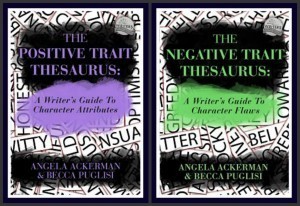 If writing the Positive Trait & Negative Trait Thesaurus books have taught me anything, it is that compelling characters are neither good nor bad, perfect or fundamentally flawed.
If writing the Positive Trait & Negative Trait Thesaurus books have taught me anything, it is that compelling characters are neither good nor bad, perfect or fundamentally flawed.
Instead, they are all of these things. Each has a set of good, admirable qualities, even while displaying frustrating or off-putting flaws. They have strengths and weaknesses in different areas, making them both skilled and inept at the same time. But that’s the point, isn’t it? The best characters are realistic and believable because they are just like real people. Like you or I. They have a balance of positive and negatives that give them a wholly unique viewpoint, attitude, belief system and personality.
Some writers want to create characters that ONLY have the best qualities, ones that prove they are good human beings that readers will admire and root for. They find it easy to create a blend of traits like loyalty, helpfulness, intelligence and determination, forming a true hero that can handle anything. But when it comes to choosing flaws, they pull their punches, worried that if they add a trait like selfishness, perfectionism, or impulsiveness, readers will view them as unlikeable.
Other writers EMBRACE the flawed character. They pile up flaws, forged by a hard past filled with emotional wounds that refuse to heal. They add layers of negative traits like suspicious, mistrustful and erratic, all carefully planned around an elaborate backstory that supports the necessity of emotional armor (flaws) that make them who they are.
But when it comes to admirable traits, they struggle. What positive traits would logically survive such a painful past? If say, the character was a victim of horrible abuse and to cope, they became a mistrustful, anti social liar, how can they also be friendly or kind? How can they logically be generous or carefree while harboring such deep flaws?
These are not simple questions to answer. Character creation, when done well, is not an easy process. Too many flaws (or even choosing the wrong type of flaw), and a character becomes unlikeable. Too many positive attributes, and they come across as altruistic, unrealistic or even (yawn) boring. So how can we achieve balance?
 Understand Who and What Shaped Your Character
Understand Who and What Shaped Your CharacterJust like every one of us, your character has a past. And while yes, backstory turmoil and pain should be exploited to create conflict and tension in the present, there is always good mixed with bad. In real life, the good experiences (and people) are what keep us going no matter how bad it gets. So think about your character’s positive experiences and past influences along with negative ones as you dig around in their backstory. Understand what the character learned from both past trials and successes, and how each lesson will help to shape his personality.
Uncover Your Character’s Moral Center
Every character has a set of moral beliefs, even the villain. Think deeply about the moral code your character lives by, and what lines he will not cross. (HINT: the “why” of moral choices will be embedded in his backstory, and who/what helped shaped his view of the world.) Morals are the pulsing heart of motivation and action, so determine your character’s sense of right and wrong. (Read more about determining your characters morality HERE.)
Prod His Wound to See What Hurts
Nothing modifies behavior like pain, so understanding what deep emotional wounds your character carries is key to knowing what he also yearns for more than anything (Acceptance? Love? Safety? Freedom?) This wound and the fear that it can happen again is what causes deep flaws to form. They act as “false protection” to keep the hurt from reoccurring, and usually hold people at a distance. Here’s a helpful list of Common Wound Themes.
For example, a character who experienced rejection might close himself off from potential lovers because of his fear of being rejected again. How would flaws “help” him by pushing women away? Is he arrogant? Promiscuous? Uncommunicative? Dishonest?
And what attribute, if nourished, might grow strong enough to vanquish these flaws that hold him back from connection? Respectfulness? Honor? Loyalty? Empathy? Finding a major flaw’s opposite is the pathway to balance & resolving Character Arc through personal growth.
Give All Characters The Chance for Redemption
Some characters are intentionally unbalanced. If you have a character who leans one way more than the other (such as a villain or anti hero) by story necessity, then make sure you also build in something that suggests no matter how flawed or terrible, there is a chance they can change or be redeemed.
Every negative has a positive, and no matter how dark or skewed a character’s view is, or what he feels he’s better without, there will always be a flicker of light that can help him find his way back to becoming whole and complete. Show this to readers, be it a motive that is pure, a relationship with someone that is on some level healthy and good, or a positive quality that is admirable.
Balancing your character’s positive and negative sides means some deep brainstorming! If it helps, here are some more ideas on how to plan a character before you start writing.
How do you create balanced characters?
Image: Bykst @ Pixabay
The post Personality Traits: Building a Balanced Character appeared first on WRITERS HELPING WRITERS™.
January 5, 2015
Writing Patterns Into Fiction: Scene and Sequel
Hi everyone! Welcome back from a wonderful break. I imagine, like us, some holiday rest and relaxation was just what the doctor ordered, but now you are getting a bit itchy, ready to jump back into the fray. To start things off right in 2015, we are diving right into the thick of writing technique with a guest post by author Raven Oak, who is joining us to talk about the successful pattern of Scene and Sequel. This is a must read, especially for those who do not know about this technique. Trust me, your writing will thank you!
Scene and Sequel
 When I began writing seriously—not the scribbles in a notebook of plots I’d write someday or the half-started, never-finished stories I cranked out, but the “I want to write novels for a living” point in my career—my first completed book felt juvenile. Portions dragged. And those that didn’t, sped through the action without anyone stopping to smell any proverbial roses. So how does one develop solid pacing through a novel while building tension, developing characters, describing setting, and advancing plot lines? The answer is a little trick called Scene and Sequel. Why? Because humans like patterns.
When I began writing seriously—not the scribbles in a notebook of plots I’d write someday or the half-started, never-finished stories I cranked out, but the “I want to write novels for a living” point in my career—my first completed book felt juvenile. Portions dragged. And those that didn’t, sped through the action without anyone stopping to smell any proverbial roses. So how does one develop solid pacing through a novel while building tension, developing characters, describing setting, and advancing plot lines? The answer is a little trick called Scene and Sequel. Why? Because humans like patterns.
Scene and Sequel is a technique developed by Dwight Swain in his book, Techniques of the Selling Writer. (If you haven’t checked it out, I would strongly suggest doing so as he covers a wide range of simple tricks writers can use to develop better stories.)
Readers pick up a work because they want a powerful and emotional experience. It’s an escape from the drudgery of the real world and a way to live vicariously through others. As a writer, you must create and maintain an illusion strong enough to fool the reader. Pacing helps create and maintain this illusion.
Novels are typically comprised of chapters, which are often made up of scenes. To keep the ebb and flow of a novel going, each scene should then be identified as being a scene or a sequel.
A scene has the following pattern:
Goal—what the character wants. Must be clearly definable
Conflict—series of obstacles that keep the character from the goal
Disaster—makes the character fail to get the goal
And a sequel has the following pattern:
Reaction—emotional follow through of the disaster.
Dilemma—a situation with no good options
Decision—character makes a choice (which sets up the new goal).
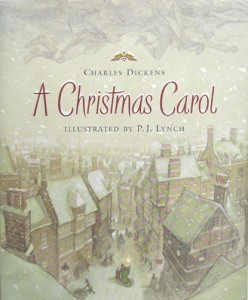 To understand how this works, let’s look at A Christmas Carol by Charles Dickens.
To understand how this works, let’s look at A Christmas Carol by Charles Dickens.
Chapter 1 is a SCENE
Goal—Scrooge wants money and to be left alone.
Conflict—When the charity solicitors and Scrooge’s nephew visit, they stir up feelings in Scrooge and memories of his sister, Fran. As Scrooge arrives home, he sees his old business partner’s (Marley’s) face in the doorknocker, and then later in the pictures in his fireplace mantel. Scrooge tries to dismiss the conflicting emotions/thoughts this stirs up.
Disaster—The disaster is when Marley’s Ghost arrives to warn Scrooge that three ghosts will visit him. Each one has a lesson to teach him. If he doesn’t heed their lessons, Scrooge’s afterlife will be full of pain and misery.
Scenes tend to be full of action and tension that push the plot forward. Remember, every scene you write must further the plot and/or further the character development.
Chapter 2 is a SEQUEL
Reaction—Scrooge’s initial reaction is to write off Marley’s visit as the result of some bad food. When the Ghost of Christmas Past arrives, Scrooge tries to send him away. He claims he doesn’t want or need the lesson, but having no choice, Scrooge accompanies the ghost into the past.
Dilemma—As Scrooge journeys through quite a few joyful and painful memories, he begins to doubt the decisions he’s made. Scrooge faces a dilemma: whether or not to believe himself guilty of bad judgment and humbug, or whether to continue avoiding Christmas, its joy, and his family as he has for many-a-year. Neither are good options, so he picks the option he thinks he can live with.
Decision—Scrooge decides the past is too painful, because it’s made him doubt himself. In anger, he decides to extinguish the light given by the Ghost of Christmas Past, and thus, his own light. At least momentarily.
What a sequel does is give our character(s) an opportunity for reflection and self-introspection. The decision will lead us into our next scene, where the character(s) develop a new goal. In the case of Scrooge, Chapter 3 (scene) begins with a new goal: Scrooge reacted rashly in extinguishing the light. At the sight of the Ghost of Christmas Present, he decides he will go with him willingly and see what there is to see. And if necessary, think further on his own attitudes and prejudices. He’s not ready for a huge change yet, but change is happening—as change should be happening to your characters as well.
Scenes and sequels should continue to alternate the entire length of the novel, and in doing so, they’ll create a natural flow for both plot progression & character development. Many authors plan or outline the sequence of events using scene & sequel on index cards before writing.
Just about any novel you read will follow this rhythm. It seems simple, but structure usually is. Pick up a book and give it a flip through—I bet it follows the pattern!
Do you use Scene and Sequel, or is this something you’re planning on testing out? Let us know in the comments!
![Pageflex Persona [document: PRS0000447_00014]](https://i.gr-assets.com/images/S/compressed.photo.goodreads.com/hostedimages/1420901894i/13288469.jpg) Guess what? Raven’s Epic Fantasy has just released, so please enjoy this blurb, and if you like, add it to your Goodreads List, or snag a copy from Amazon.
Guess what? Raven’s Epic Fantasy has just released, so please enjoy this blurb, and if you like, add it to your Goodreads List, or snag a copy from Amazon.
Her name was Adelei, a master in her field, one of the feared Order of Amaska. Those who were a danger to the Little Dozen Kingdoms wound up dead by her hand. The Order sends her deep into the Kingdom of Alexander, away from her home in Sadai, and into the hands of the Order’s enemy.
The job is nothing short of a suicide mission, one serving no king, no god, and certainly not Justice. With no holy order to protect her, she tumbles dagger-first into the Boahim Senate’s political schemes and finds that magic is very much alive and well in the Little Dozen Kingdoms.
While fighting to unravel the betrayal surrounding the royal family of Alexander, she finds her entire past is a lie, right down to those she called family. They say the truth depends on which side of the sword one stands. But they never said what to do when all the swords are pointing at you.
Want more Raven? Catch her on Twitter, Facebook or visit her at her website!
The post Writing Patterns Into Fiction: Scene and Sequel appeared first on WRITERS HELPING WRITERS™.
January 4, 2015
New Year, New Goals: Have You Made a Plan Yet?
 Happy New Year, everyone! I am greatly looking forward to what 2015 will bring, and I hope you are too. This is the time for us to think about the year ahead, and how to choose achievable goals. If we want happiness and fulfillment to happen, we have to shape our own futures through hard work, concentrating on what is important to each of us so we can succeed.
Happy New Year, everyone! I am greatly looking forward to what 2015 will bring, and I hope you are too. This is the time for us to think about the year ahead, and how to choose achievable goals. If we want happiness and fulfillment to happen, we have to shape our own futures through hard work, concentrating on what is important to each of us so we can succeed.
One of the smartest things Becca and I started doing a few years ago was to create and follow a yearly business plan. We call it our “Plan on a Page” and keep it on the wall so we can reference it as needed while we work. Our plan isn’t complicated or difficult to follow…it simply outlines the major goals we want to accomplish for the year, areas of growth to focus on, and approximate deadlines (if they apply). This ensures that each and every day, we are working toward our goals, rather than getting sidetracked by other projects.
Think about making a plan yourselves this year! First, take some time for reflection. Then, if you like, here’s a link to the template Becca and I use, and some steps showing how to create a plan for yourself.
Speaking of what the year ahead will hold, Becca and I have two books we hope to release on The Setting Thesaurus. The timeline for this was to be Spring, but we are also working on a secret project that may bump our release date. I know, I know…delays are never fun. All I can say is that if we do not make the Spring release window, it will be for a very good reason. One that falls within the EPIC category. Okay, I better shut up about the whole thing now, because it is VERY HARD for Becca and I to stay quiet about this nameless cool thing in the works!
WINNER WINNER, CHICKEN DINNER
Last month we held a contest for a two 25 page critiques, one from Becca, one from myself. I am happy to announce that Audrey King (Contemporary Adult Romance) and Rachel Seo (Upper Mid-grade Adventure) have been chosen by Random.org as our winners. Congrats, ladies! Watch your email boxes for further instructions!
 In December we released Emotion Amplifiers, a free ebook companion to The Emotion Thesaurus and we hope you snagged a copy. (If you haven’t yet, make sure you do, as it’s a handy “add on” to ET content.) If you have a copy and you’ve used it a time or three, we hope you’ll consider leaving a review, as they really help us so much!
In December we released Emotion Amplifiers, a free ebook companion to The Emotion Thesaurus and we hope you snagged a copy. (If you haven’t yet, make sure you do, as it’s a handy “add on” to ET content.) If you have a copy and you’ve used it a time or three, we hope you’ll consider leaving a review, as they really help us so much!
Image: FlashBuddy @ Pixabay
The post New Year, New Goals: Have You Made a Plan Yet? appeared first on WRITERS HELPING WRITERS™.
December 20, 2014
Happy Birthday Angela, and Merry Christmas Everyone!

Pixabay
Happy Birthday, Angela! I am SO glad that you were born on this day only 29 years ago ;). Sleep in, eat some extra chocolate, and take it easy today! And if anyone else would like to congratulate the birthday girl, you can do so here in the comments, on her Facebook page, or on her Twitter account.
Now that Christmas is upon us, Angela and I are getting ready to take our annual blog-cation through the end of the year. But because I like to hear myself talk, I need to leave you with a few final words before signing off:
First of all, the 25-page critique contest is now closed. We’ll be randomly drawing two names after the first of the year and will announce the winners when we return on January 5th. Thanks for entering, everybody! I’m SO excited to dig into some good reading in the new year.
 Secondly, I hope you all are enjoying your (mostly) free copy of Emotion Amplifiers. Some day soon it will be free at Amazon, but if you just can’t wait or would prefer it in a different format, you can also snag a copy at
Secondly, I hope you all are enjoying your (mostly) free copy of Emotion Amplifiers. Some day soon it will be free at Amazon, but if you just can’t wait or would prefer it in a different format, you can also snag a copy at
Barnes & Noble and
Lastly, Angela and I would like to thank you all so much for your continued support this year. You all are honestly the most encouraging, uplifting, helpful, and FUN bunch. We’re so grateful to everyone and wish all of you happy holidays and a spectacularly successful New Year! We’ll see you all January 5th!

Jeff Golden @ Creative Commons
The post Happy Birthday Angela, and Merry Christmas Everyone! appeared first on WRITERS HELPING WRITERS.
December 18, 2014
Thank You From WHW: an Emotion Amplifiers eBook Gift
Hi everyone! With it being the Season of Giving and all, Becca and I thought we would wrangle together a small gift for you: Emotion Amplifiers, the popular PDF companion to The Emotion Thesaurus, is now an ebook. Even better, it’s free.
 As writers, we all understand just how important emotion is. Commanding it well means creating authentic characters who share their raw, powerful stories with readers, pulling them in deep and making them care.
As writers, we all understand just how important emotion is. Commanding it well means creating authentic characters who share their raw, powerful stories with readers, pulling them in deep and making them care.
But how do we push characters to the edge of an emotion? How do we draw out every last drop of tension that’s possible? The answer is to amplify their emotions through whatever means we can, applying pressure that tests limits, causes instability or even leads a character toward rash behavior, bad decisions, and ultimately, mistakes.
Emotion Amplifiers profiles fifteen different conditions (such as Pain, Exhaustion, Attraction and Addiction) that can help complicate a situation, causing emotional volatility and stress. Like The Emotion Thesaurus, each entry lists the Physical Signals, Mental Responses and Internal Sensations a character might experience while in the throes of an Emotional Amplifier.
We hope this ebook makes a strong addition to your virtual bookshelf, and helps you find creative and compelling ways to add complication to your hero’s rocky path toward his goal. Snag your copy (or gift it to another writer!) here:
*A small note regarding the Kindle version…unfortunately despite many reports of free, Amazon has not yet lowered the price to zero, and so it is currently listed at .99 cents. So, if you want to wait for it to go free, help us by scrolling down on the Amazon listing to “report a lower price” and provide Amazon with one of the other links above!
However, if you MUST HAVE THE PRECIOUS NOW, then feel better knowing that every year, Becca & I choose a charity to donate to on behalf of Writers Helping Writers. This year, we are giving $1000 to The Polaris Project. We can do this because you guys support us by buying books, so thank you! This worthy charity helps victims of human trafficking, and we couldn’t be happier to list it as our WHW 2014 Charity of the Year. To find out more about what they do, please click HERE.
 But wait, there’s more!
But wait, there’s more!We have one more early Christmas gift to hand out: a shot to WIN OUR FEEDBACK!
Yes, it’s Critiques For U time, Christmas Edition. This means you could win one of two 25 page critiques! If you would like to enter, just leave us your contact information by filling out this form. We will contact winners in the coming weeks and critique in January, so polish up your first 25 pages!
Happy writing, and thank you so much for all your kind support of us over the years.
~ Angela & Becca
(PSSST! Shares are always appreciated, and holy bananas, if you already have Emotion Amplifiers, we would absolutely love it if you could take the time to review it!)
The post Thank You From WHW: an Emotion Amplifiers eBook Gift appeared first on WRITERS HELPING WRITERS.
Writers Helping Writers
- Angela Ackerman's profile
- 1022 followers



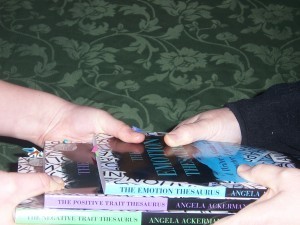
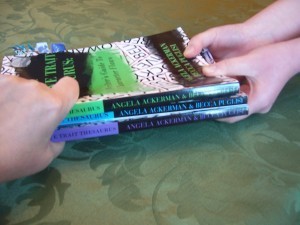
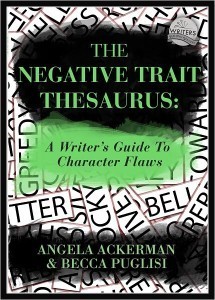
![Pageflex Persona [document: PRS0000046_00058]](https://i.gr-assets.com/images/S/compressed.photo.goodreads.com/hostedimages/1421156871i/13330594.jpg)
